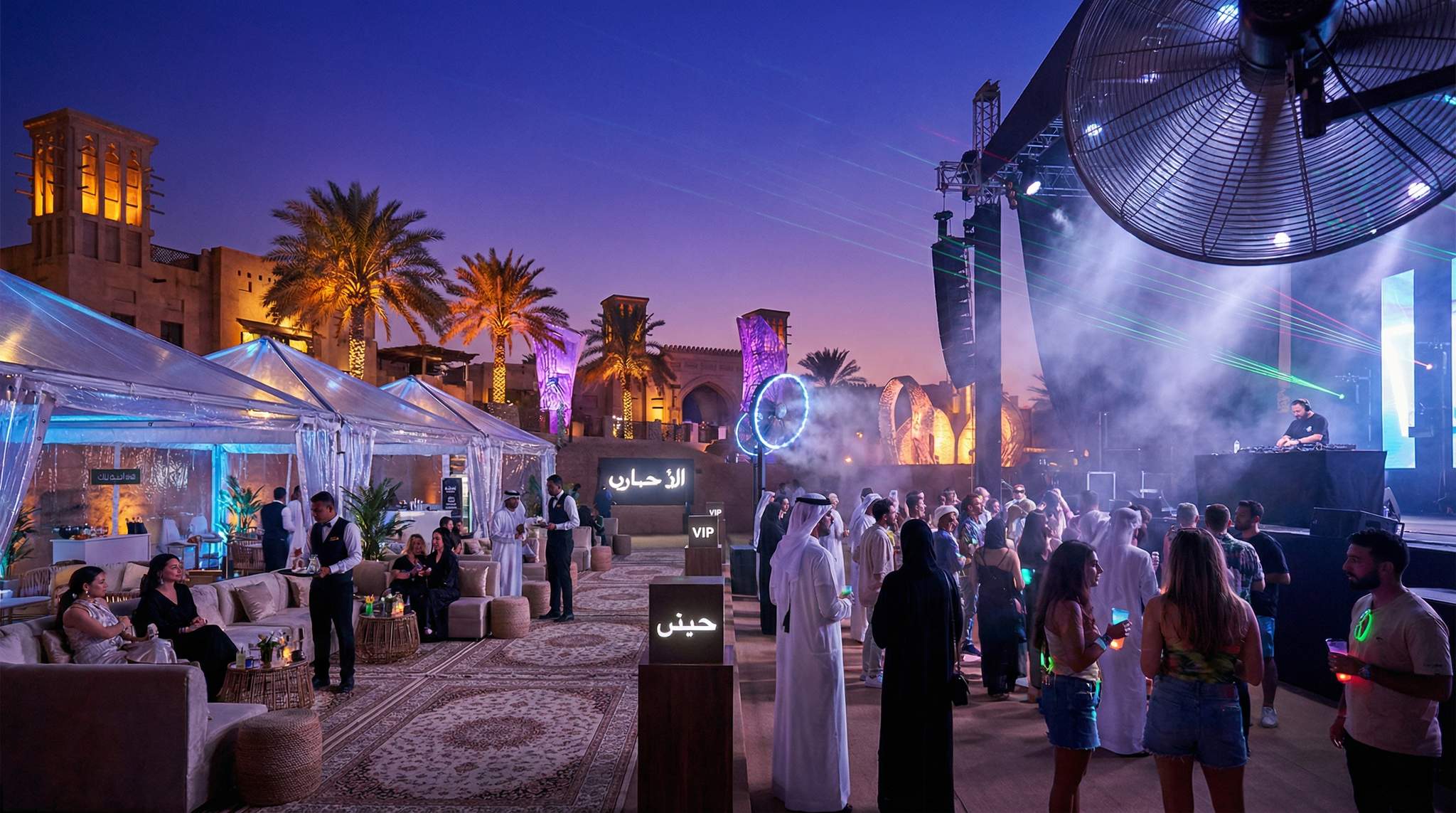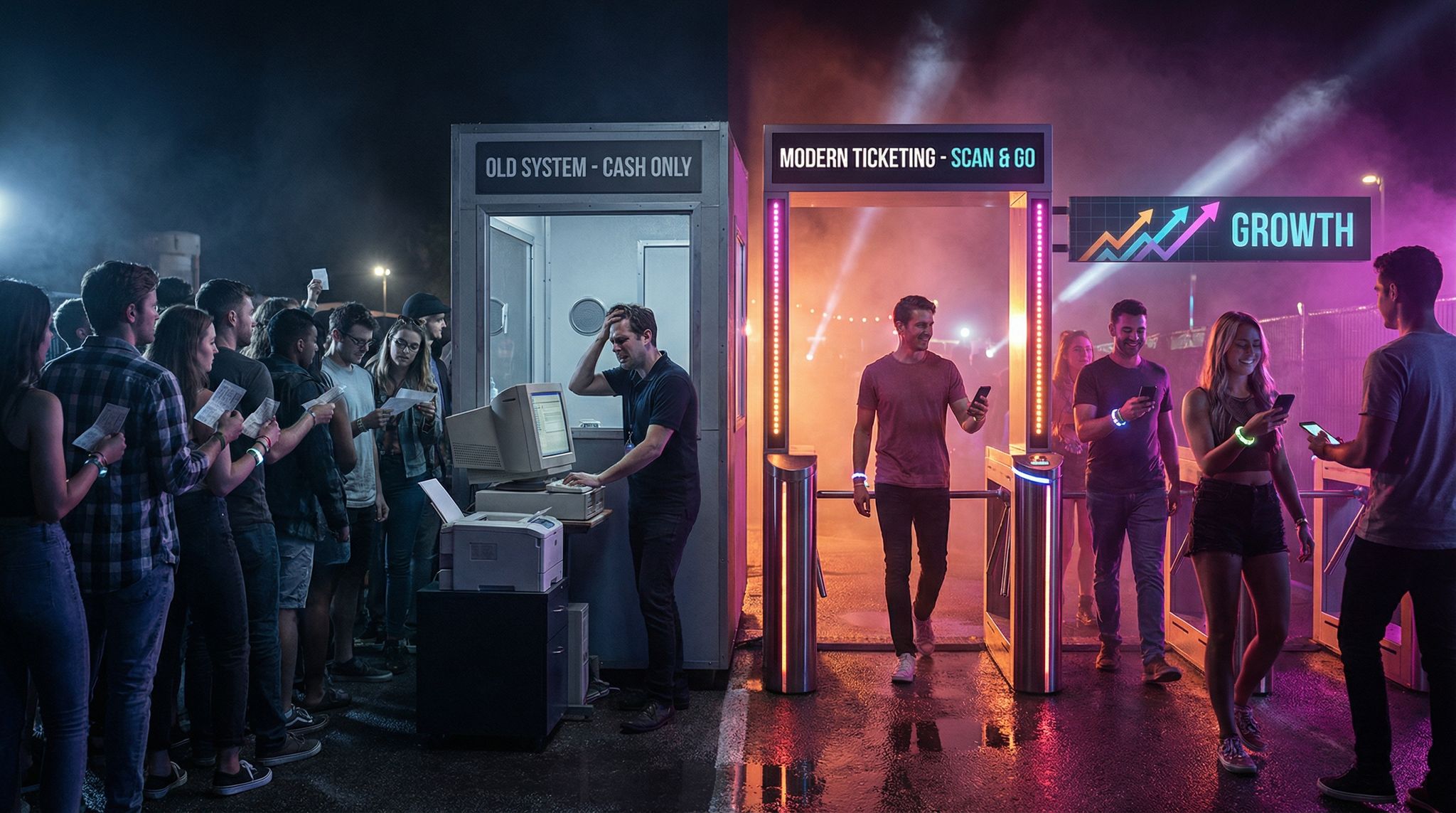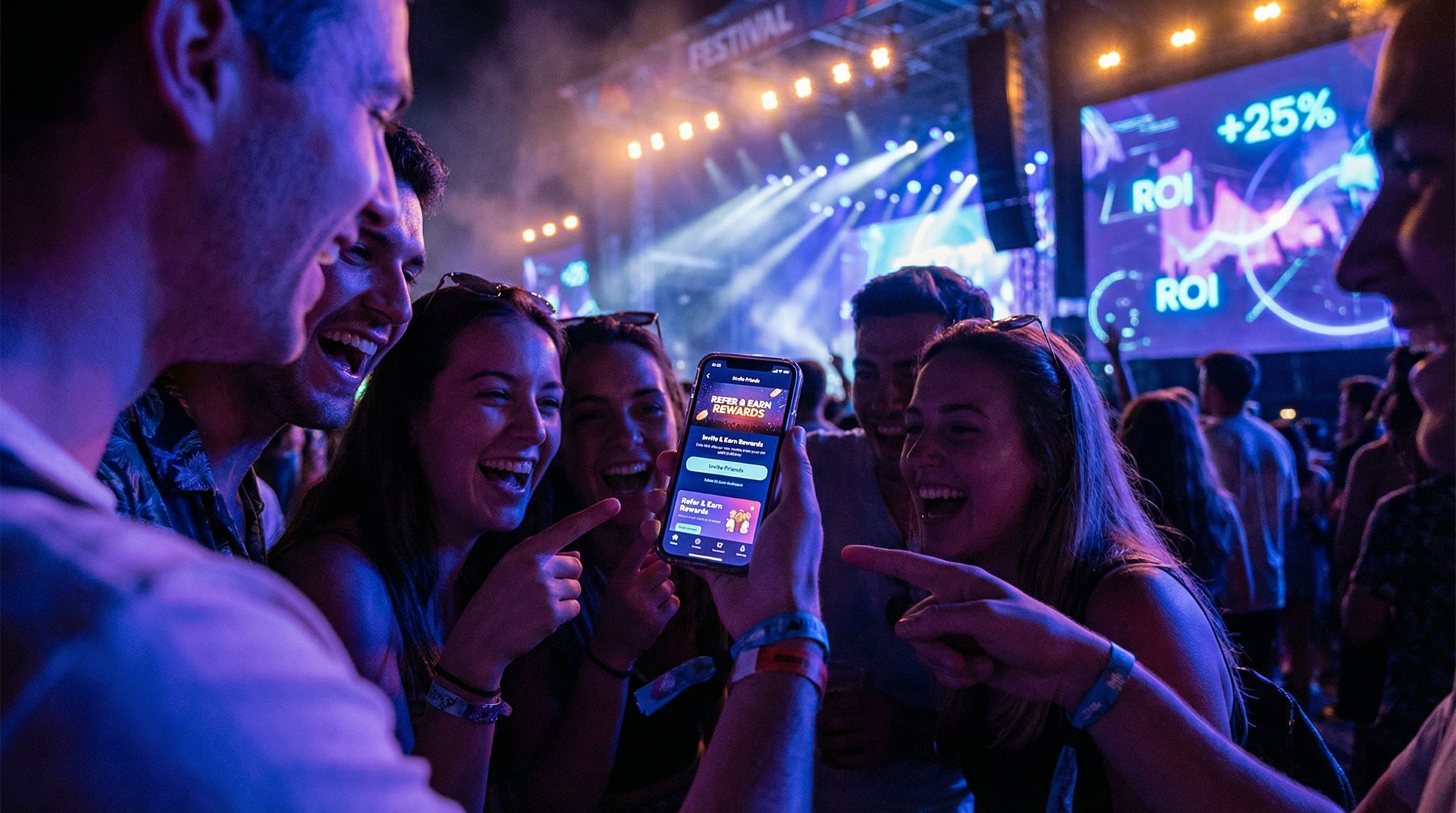Navigating Gulf Nights: A Festival Producer’s Case Study
Outdoor festivals in the Middle East Gulf region come with unique challenges and opportunities. Blistering daytime heat means many events spring to life after sunset, transforming desert venues into bustling night festivals. This case study reviews several Gulf evening festivals – from massive music extravaganzas in Saudi Arabia to cultural celebrations in the UAE and culinary nights in Qatar – to uncover how successful festival producers handle cooling strategies, modesty norms, sponsor ecosystems, and VIP expectations. The goal is to provide practical insights, drawn from real-world Gulf events, for festival producers planning experiences under the stars in this region.
Embracing the Evening: Timing and Venue Selection
Choosing when and where to hold a festival in the Gulf is the first critical decision. Seasoned festival producers in the region have learned to leverage cooler seasons and evening hours:
- Climate Considerations: In Gulf countries like the UAE, Saudi Arabia, and Qatar, summer daytime temperatures often exceed 40°C (104°F). Major festivals are therefore typically scheduled during the cooler months (October through March) or exclusively in the evenings. For example, the Sheikh Zayed Festival in Abu Dhabi runs from late afternoon to midnight in winter, taking advantage of mild desert nights. Similarly, Saudi Arabia’s Riyadh Season events and music festivals like MDLBEAST Soundstorm are held in late fall or winter when outdoor conditions are more tolerable.
- Nighttime Festivals: Many Gulf events brand themselves around the night. Jeddah Season, a two-month festival in Saudi Arabia’s coastal city, heavily features nighttime concerts, fireworks, and waterfront entertainment. By starting after sunset, they not only dodge the worst heat but also create a more vibrant atmosphere with light shows and pyrotechnics that shine against the dark sky. In the UAE, attractions like Dubai’s Global Village (a multi-cultural festival park) open at 4 or 5 PM and go late into the night, ensuring visitors enjoy cooler temperatures.
- Venue Selection: Gulf festival producers get creative with venues to mitigate climate. Coastal locations or islands (like Yas Island in Abu Dhabi for outdoor concerts) benefit from sea breezes in the evening. Urban festivals might use shaded streets or parks that cool down faster at night. In more extreme settings, purpose-built sites are constructed: MDLBEAST Soundstorm’s team built a massive desert festival ground outside Riyadh, then equipped it with infrastructure to support night-long events. Choosing a venue often goes hand-in-hand with climate control measures – open fields, waterfront promenades, or even indoor-outdoor hybrid venues (like partially covered amphitheaters) provide a balance between open-air experience and respite from heat.
Lesson: In the Gulf, timing is everything. Successful festivals pick the right season and start late in the day. Venue choices, from coastal parks to custom desert sites, are made with cooling and comfort in mind.
Keeping It Cool: Innovative Cooling Strategies
Even at night and in winter, Gulf festivals must often contend with residual heat and large crowds. Festival producers have developed an arsenal of cooling strategies to keep attendees comfortable:
Turn Fans Into Your Marketing Team
Ticket Fairy's built-in referral rewards system incentivizes attendees to share your event, delivering 15-25% sales boosts and 30x ROI vs paid ads.
- Misting and Evaporative Cooling: A common sight at summer-night events in the Gulf is the misting fan. These large fans spray a fine water mist that evaporates quickly in the dry air, dropping the ambient temperature in their vicinity. For instance, at outdoor concerts during Jeddah Season, organizers deployed misting fan stations and “cooling zones” where attendees could take a break from the heat. Such evaporative coolers are effective and economical, though producers must ensure there’s adequate water supply and drainage on-site.
- Air-Conditioned Tents & Structures: For high-end events or VIP areas, fully air-conditioned tents are the norm. At the Qatar International Food Festival (a popular evening food and music festival in Doha), large dining tents and sponsor lounges are equipped with portable AC units to keep temperatures comfortable. In some cases, entire temporary structures are air-conditioned: for example, luxury VIP sections at festivals in Dubai often resemble open-fronted suites with AC pumping cool air over seated guests. Event planners budget significant power generation capacity to run these cooling systems – often using silenced generators placed away from the crowd.
- Cooling Technologies: The Gulf has even seen cutting-edge cooling solutions. Qatar, preparing for outdoor events around the FIFA World Cup, tested solar-powered outdoor air-cooling technology that blew cooled air into fan zones. While a typical music or food festival might not install stadium-style air conditioning, producers in the region aren’t shy about renting heavy-duty cooling equipment. For instance, some large-scale events in the UAE have used chillers with ducting to push cold air across outdoor dance floors, effectively creating an “open-air AC”. These systems can lower temperatures in a targeted area by several degrees, making a night festival feasible even in warmer months.
- Hydration and Shade: Cooling the air is one approach; cooling the people is another. Savvy festival organizers institute hydration stations with free water or electrolyte drinks, often sponsored by beverage companies. First aid tents watch for signs of heat exhaustion, ready with cold packs. Moreover, even at night, providing shaded or covered areas (using stretch tents or canopies) protects attendees from any remaining sun at dusk and keeps in some cooler air. At a Gulf food and music night market in Bahrain, for example, organizers used large traditional tents (open at the sides for airflow) where families could sit on carpets – these tented majlis areas not only offered cultural ambiance but also relief from the heat.
Collectively, these measures mean that even when temperatures hover around 30°C (86°F) in the evening, festival-goers can stay safe and comfortable. Producers must incorporate the cost of cooling into their logistics budget and often hire specialized climate control vendors. Failing to plan for heat can be disastrous – attendees will leave early or, worse, suffer heat illnesses. One lesson learned came from an early summer event in Kuwait where inadequate cooling led to many guests seeking medical aid for heat exhaustion. Since then, organizers in that city have shifted schedules and doubled their misting fan deployments to avoid a repeat.
Lesson: Comfort is key. Gulf festivals invest in misting fans, air-conditioned lounges, and ample hydration. Budget for cooling infrastructure and expertise – it’s as critical as sound and lighting in desert environments.
Planning a Festival?
Ticket Fairy's festival ticketing platform handles multi-day passes, RFID wristbands, and complex festival operations.
Respecting Modesty and Cultural Norms
Hosting a festival in the Gulf means operating within local cultural and religious norms, especially around modesty and public behavior. Festival producers from abroad quickly learn to adapt their events to respect these norms while still delivering a fun experience:
- Dress Codes for Attendees: In Middle Eastern Gulf societies, modest dress is generally appreciated, even if not always legally mandated (rules vary by country). Festivals openly communicate dress guidelines in advance, advising international visitors to avoid extremely revealing outfits. At Saudi Arabia’s family-friendly Winter at Tantora cultural festival, for example, attendees are reminded to wear attire that covers shoulders and knees. In practice, you’ll see a mix – local women may attend in abayas or hijabs by choice, while tourists opt for loose, light clothing. The key is setting the tone that everyone should dress respectfully. Security staff at festival entrances in more conservative locales have been trained to politely deny entry to guests whose clothing crosses the line (for instance, attire deemed too scant for a public family event).
- Artist Attire and Performance Adjustments: Festival producers also coordinate with performers on cultural expectations. Major international artists have modified their costumes for Gulf shows – a pop singer might swap a skimpy outfit for a more covered stage costume out of respect. At the Dubai Jazz Festival, which attracts global acts, organizers brief artists on local sensibilities (e.g. avoiding swearing on stage or politically sensitive comments). In one notable incident, a prominent rapper was scheduled for Jeddah World Fest in Saudi Arabia but canceled her appearance, partly due to concerns over performance content and attire in the conservative context. The festival swiftly replaced her with other international stars willing to adhere to local guidelines. The lesson is clear: book artists who are flexible and culturally aware, and have a plan B in case an act withdraws over such issues.
- Gender and Social Mixing: Historically, some Gulf countries enforced gender-segregated sections or “family only” areas at public events. This is changing with reforms – for instance, today’s big Saudi festivals like MDLBEAST Soundstorm have mixed-gender crowds dancing together, which was unheard of just a few years ago. However, festival producers still ensure safe spaces for women and families. Many events designate family zones (alcohol-free, calmer seating areas for women, children, and men with families) separate from the rowdier general admission. This caters to attendees who prefer a more conservative environment. Additionally, a strong security presence is deployed to deter any harassment – something organizers had to ramp up after early editions of mixed-gender events revealed issues. Clear codes of conduct (often displayed on screens and tickets) reinforce respectful behavior. The result is an environment that balances newfound social freedoms with respect for those who value modesty and safety.
- Religious Considerations: In the Gulf, festival scheduling often respects religious times. During the call to prayer (which occurs multiple times in the evening), some festivals pause the music or lower volumes, and many provide on-site prayer tents for attendees and staff. A festival producer in Qatar noted that incorporating a prayer break into the event schedule not only showed cultural respect but also offered a natural intermission for the audience to rest and cool down. And while non-Muslim attendees might not expect it, these short pauses hardly detract from the overall experience – in fact, they can add a unique local rhythm to the event’s flow.
By thoughtfully respecting local norms, Gulf festival organizers create an inclusive atmosphere that welcomes both cosmopolitan youth and traditional families. International festival directors coming into this region often work with local cultural consultants to avoid missteps – whether it’s getting advice on appropriate staff uniforms, or ensuring that festival signage and marketing materials are culturally sensitive (e.g. avoiding imagery that might be seen as offensive). The success of events like Expo 2020 Dubai’s open-air concerts and Bahrain’s Spring of Culture performances underscores that embracing local culture elevates a festival rather than hindering it.
Lesson: Cultural respect is non-negotiable. Adapt dress codes and content to local norms, accommodate prayer times, and design spaces that make all attendees – from trend-setting youths to conservative families – feel comfortable. Educating your team and performers on these expectations well in advance is vital.
Sponsors and the Gulf Festival Ecosystem
Big festivals everywhere seek sponsors, but in the Gulf the sponsor ecosystem has its own flavor and constraints. Understanding who is eager to back events (and who is off-limits) can make or break a festival’s budget:
Boost Revenue With Smart Upsells
Sell merchandise, VIP upgrades, parking passes, and add-ons during checkout and via post-purchase emails. Increase average order value by up to 220%.
- Government and Royal Patronage: Unlike many Western events, Gulf festivals often enjoy direct government backing. Tourism boards, cultural ministries, or even members of the royal family may officially patronize an event. This patronage can come with funding or in-kind support (such as free use of a venue or police services), reducing operational costs. For example, Muscat Festival in Oman was organized by the city municipality with government funding, treating it as a national cultural showcase. Similarly, Saudi Arabia’s entertainment authority underwrites mega-events like Riyadh Season and MDLBEAST, as these festivals align with national tourism and Vision 2030 goals. The upside of government involvement is access to substantial resources and easier permitting; the trade-off is that organizers must align with national branding and values (no controversial themes, and an expectation of flawless execution as it reflects on the country’s image).
- Local Corporate Champions: The Gulf region’s corporate landscape tends to be dominated by a few key sectors, and these players are omnipresent sponsors. Telecom companies (e.g. STC in Saudi, Etisalat in the UAE, Ooredoo in Qatar), banks, airlines, and automotive brands frequently sponsor festivals. They see events as prime opportunities to reach a young, affluent audience. At the Dubai Food Festival, it’s common to have an airline like Emirates as a lead sponsor (flying in celebrity chefs), a bank sponsoring a VIP lounge for its clients, and a telecom company providing free Wi-Fi on site with its branding. Festival producers tailor sponsorship packages accordingly – offering naming rights to stages, presenting sponsorship of key attractions (like a “Pepsi Cooling Station” misting tent or a “Toyota VIP Parking Zone”), and extensive on-site branding. One successful approach at a UAE music festival was creating interactive sponsor activations: a leading telecom set up a recharge lounge with phone charging stations and VR demos, giving festival-goers a fun respite while effectively promoting the brand.
- Restrictions on Certain Sponsors: Producers must navigate cultural and legal restrictions on sponsorships. Notably, alcohol and gambling sponsors – common in Western festivals – are largely prohibited or very limited in most Gulf countries. For instance, you won’t see a beer company sponsoring a public festival in Saudi Arabia or Kuwait, where alcohol is banned outright. In the UAE and Bahrain, alcohol sales are legal in specific venues, so a beverage brand might be involved (for example, a Dubai event can have a beer garden sponsored by a global beer company, but marketing must be sensitive and confined to that area). Tobacco advertising is also strictly controlled. Therefore, Gulf festival organizers often lean towards family-friendly sponsors: tech gadgets, soft drink and food brands, automotive, hospitality, and especially real estate and tourism developments looking to advertise to crowds. Creative budgeting is essential if your festival can’t rely on lucrative alcohol sponsorships – you’ll likely seek extra support from tourism authorities or major corporations to fill that gap.
- Sponsor Expectations and Hospitality: In the Gulf’s relationship-driven business culture, sponsors expect premium hospitality and visibility. It’s standard to provide major sponsors with complimentary VIP tables or corporate boxes at events. For example, at a large-scale concert in Doha, the presenting sponsor (a national bank) was given a private enclosed viewing platform for their invited guests, complete with buffet catering. Sponsors often bring important clients or even government VIPs to these events, so festival producers effectively become hospitality managers too. This means arranging meet-and-greets with artists for top-tier sponsors, delivering on promised brand exposure (LED screens, frequent shout-outs, logo placements everywhere), and ensuring that sponsor guests receive red-carpet treatment. Dignitaries might show up with very short notice, and organizers need to be ready with a protocol team to welcome them. One producer recounts how, during a Formula 1 after-race concert in Bahrain, an extra 50 VIP guests of a sponsor arrived unannounced – the festival team quickly opened an overflow VIP section and duplicated the catering to accommodate them. Flexibility and over-preparation in sponsor hospitality can save the day.
In summary, building a solid sponsor ecosystem in the Gulf often hinges on aligning with public sector initiatives and attracting the big private-sector players. It’s a different mix than a typical US or European festival, and it requires networking at high levels and delivering value beyond just logo placement. However, when done right, sponsorships in the Gulf can be extremely generous, sometimes covering a majority of festival expenses (especially when a government or national company sees the event as furthering a strategic goal). Producers should start sponsor outreach early, leveraging any personal introductions, and be ready to customize packages – in this region, a bespoke approach (“Your own VIP chalet at our festival with catering for 30 guests…”) can seal the deal more effectively than a standard gold-silver-bronze offer.
Lesson: Know your sponsors and their needs. Forge ties with government agencies and local corporations. Expect to forgo certain categories like alcohol, but tap into telecom, finance, and tourism sponsors. In return, be prepared to pamper sponsors and their guests with VIP perks and prominent exposure.
Need Festival Funding?
Get the capital you need to book headliners, secure venues, and scale your festival production.
VIP and VVIP: Meeting High Expectations
No discussion of Gulf festivals is complete without addressing VIP culture. In this region, VIP guests – and even a tier above that, VVIPs – are a significant part of the audience mix. Catering to them is not just about status; it’s about cultural hospitality and business networking. Festivals that nail the VIP experience reap rewards in reputation and return attendance. Key considerations include:
- Tiered VIP Experiences: Gulf festivals often offer multiple tiers of upgraded experiences. Taking a cue from global trends but adding local extravagance, events might have VIP, VVIP, and even “Royal” sections. For example, MDLBEAST Soundstorm introduced a tier called “VIB” (Very Important Beast) and “VIB+” that granted perks like an exclusive elevated viewing deck, fast-track entry, valet parking, golf cart shuttles between stages, and an upscale lounge with complimentary gourmet food and beverages. At more boutique festivals – say a luxury music showcase in Dubai – organizers might sell VIP tables where groups get a private cabana, bottle service, and personal attendants. The idea is to provide a comfort and convenience level akin to a five-star hotel, transplanted to the middle of a festival.
- Majlis-Style Lounges: To give VIPs a taste of local culture and superior comfort, many Gulf festivals incorporate majlis-style lounges. A majlis is a traditional Gulf seating area with carpets, cushions or low sofas, often air-conditioned or lavishly tented at events. For instance, the Abu Dhabi Formula 1 concerts include a VIP majlis zone decorated in Arabian style – dates and Arabic coffee are served alongside international canapés and champagne (in permitted countries). These touches resonate with regional VIP guests, making them feel at home. Festival producers have learned that investing in elegant décor, ample seating, and attentive staff in these lounges leads to satisfied VIPs who stay longer (and often spend more on refreshments or merchandise, if available exclusively in VIP areas).
- Personalized Services: High-end guests in the Gulf expect personalization. It’s common for VIP ticket buyers or important invitees to have a concierge line they can call for special requests. Organizers might offer door-to-door transport (luxury shuttles or even helicopter transfers for royals), private security escorts, and merchandise bags with gifts. For example, at a prestigious art-and-music festival in Riyadh, the top-tier patrons received custom welcome packages at check-in – including shawls for the evening chill, a festival-branded portable fan (doubling as a souvenir and a cooling gadget), and a brochure acknowledging them as valued supporters. Little gestures, like bilingual staff who can speak in Arabic to an elderly VIP or offering halal gourmet meals that cater to local tastes, go a long way in this market.
- Protocol and Etiquette: VIP management in the Gulf sometimes intersects with official protocol. If royalty or high-ranking officials attend, festival producers coordinate with their protocol teams on details such as secure entrances, stage seating arrangements (you might have to reserve the central front-row seats for “Chief Guests”), and speaking opportunities. Understanding titles and forms of address is important – addressing a sheikh or minister properly, ensuring their entourage is also cared for, and timing event schedules around their arrival. Part of the lore among Gulf event producers are stories of VIP surprises: a royal guest decides on a whim to drop by a festival. The seasoned festival team always has a contingency: an extra VIP section ready, backup VIP gift bags, and an on-call translator or host to accompany the VIP through the event.
- Balancing VIP and General Audience: One challenge is ensuring VIP setups don’t alienate the general audience. The best Gulf festivals manage to keep an inclusive feel even with exclusive areas. For example, having a cordoned-off VIP section right in front of the stage is great for VIPs, but it can frustrate regular fans behind if it’s half-empty. A smart approach used by a music festival in Dubai was to have VIP platforms to the sides of the stage and a small pit for VIP in front, but still allow general admission a great view just behind. In other words, VIP perks should not ruin the vibe for everyone else. Additionally, festival organizers often allocate some prime experiences (like meet-and-greets or after-parties) to VIPs while still putting on encore performances or giveaways for the general crowd so they feel valued too.
Ultimately, Gulf festival producers treat VIP services as an integral part of the event design, not an afterthought. Investing in high-quality VIP experiences tends to pay back through repeat luxury clientele, positive word-of-mouth among business elites, and an enhanced overall brand image for the festival. Ticketing platforms like Ticket Fairy are used to manage complex guest lists and tiered tickets, ensuring that VIP guests receive their credentials seamlessly and any special access (like parking passes or lounge invites) is well-documented. The operational effort is higher, but in a region where hospitality is a point of pride, it’s effort well spent.
Lesson: Create unforgettable VIP experiences. From multi-tier VIP tickets with exclusive perks to culturally inspired lounges and white-glove service, going the extra mile for VIPs (and VVIPs) is expected in the Gulf. Just be sure to integrate these plans smoothly so that the general audience still enjoys the show.
Frequently Asked Questions
When is the best time to host outdoor festivals in the Gulf region?
The optimal time for Gulf outdoor festivals is during the cooler months from October through March. Organizers typically schedule events in the evening after sunset to avoid blistering daytime heat that often exceeds 40°C. Major events like the Sheikh Zayed Festival and Riyadh Season utilize these mild desert nights to create vibrant atmospheres.
How do Gulf festivals keep attendees cool during outdoor events?
Festival producers employ innovative cooling strategies including misting fans, evaporative cooling zones, and air-conditioned tents for VIP areas. Some events utilize industrial chillers to push cold air across dance floors or install solar-powered outdoor air-cooling technology. Hydration stations and shaded majlis areas also help prevent heat exhaustion among crowds.
What are the dress code expectations for Middle East festivals?
Attendees are generally expected to dress modestly by covering shoulders and knees to respect local cultural norms. Festivals like Winter at Tantora communicate these guidelines in advance to ensure an inclusive environment. International artists often modify stage costumes to be less revealing, and security may enforce dress standards at family-friendly events.
How does sponsorship work for festivals in the Gulf?
Sponsorship ecosystems in the Gulf rely heavily on government patronage and major local corporations like telecom companies, banks, and airlines. Unlike Western events, alcohol and gambling sponsors are largely prohibited. Instead, producers partner with entities like real estate developers that seek premium hospitality opportunities, such as private viewing boxes, for their VIP clients.
What VIP amenities are included at Gulf night festivals?
VIP experiences in the Gulf often feature tiered access including VVIP and Royal sections with five-star amenities. Guests expect majlis-style air-conditioned lounges, gourmet catering, and personalized concierge services. Events like MDLBEAST Soundstorm offer perks such as elevated viewing decks, valet parking, and exclusive gifts to cater to high-net-worth attendees and dignitaries.
Do Gulf festivals pause for prayer times?
Many festivals in the region respect religious customs by pausing music or lowering volumes during the call to prayer. Organizers often provide on-site prayer tents for attendees and staff. These short intermissions allow the audience to rest and cool down while demonstrating cultural respect, ensuring the event remains welcoming to conservative families.





